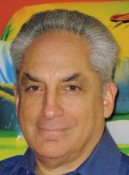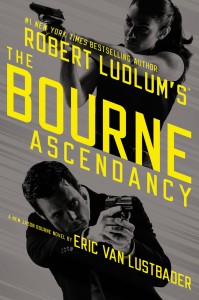Robert Ludlum’s (TM) The Bourne Ascendancy by Eric Van Lustbader
Jason Bourne has a new identity.
That is, he’s asked to take on an all-new persona in his newest adventure, ROBERT LUDLUM’S (TM) THE BOURNE ASCENDANCY by Eric Van Lustbader.
In this book, as the jacket copy notes, Bourne is asked to become a Blacksmith, “someone hired by high-level government ministers fearful of assassination attempts.”
As part of the job, Bourne is given the impossible task of impersonating the official he’s defending at a political summit meeting in Qatar. The impersonation works well, until gunmen storm the summit and kill all on the scene. Everyone except Bourne, who quickly discovers it’s not the minister who’s the target.
It’s Bourne himself.
Kidnapped, he’s transported to the underground bunker of an infamous terrorist named El Ghadan (“Tomorrow”).
El Ghadan holds Soraya Moore—former co-director of Treadstone, and a close friend to Bourne—as his captive along with her two year old daughter.
Meanwhile, the President of the United States is in the midst of brokering a historic peace treaty between the Israelis and the Palestinians—an event that El Ghadan is desperate to prevent. He demands that Bourne carry out a special mission: kill the President and if Bourne refuses, Soraya and her daughter will die. Bourne must make a monstrous choice: save Soraya and her daughter, or save the President of the United States.
It’s not a change of pace, which is still frenetic, but it is a bit of a new direction for the former intelligence operative Bourne from the black ops program Treadstone. He was introduced in Ludlum’s THE BOURNE IDENTITY (1980) as an amnesiac whose formidable skills emerge in a fight and flight for survival.
THE BIG THRILL posed a few questions about the new book to Mr. Lustbader, author of eight previous titles in the Bourne series plus his own Nicholas Linnear and Jack McClure titles and many other bestsellers.
Bourne’s working as a “Blacksmith” in this new adventure, and he has to take on an all new identity. That seems like a job well suited for his skills. Where did you start on this one? Was there a real-world incident or intelligence community/counter terrorism factoid that inspired it?
Unlike with other novels in the series, I wanted some time to have passed since the last book. I started to think of what Bourne would be doing in between the adventures I set out for him. I mean, he had to live, stay busy doing something. It’s not in his nature just to hang out. I began to think about what I’d be doing if I were him. I might have read a piece on risk assessment, I can’t actually remember. In any case, I came up with this Blacksmith idea, and it seemed to fit perfectly into Bourne’s personality.
You’ve worked with Bourne for quite a while now. Do you have to do any fresh psychological research with each book as you contemplate the impact of dark experiences on such an extraordinary hero?
Not anything specific, but I’m always reading articles on the conditions that affect him: amnesia caused by trauma, the build-up of emotion from being forced to kill people in order to stay alive—and I’m constantly aware of his state of being: that is, existing in a shadow world on the periphery of human civilization, how that isolation and anomie would affect him. That’s one of the reasons I created Sara. She’s a kind of anchor he can hold onto when events become overwhelming and he feels as if he might spiral out of control. (Sara Yadin was introduced in THE BOURNE DOMINION by her legend name, Rebeka. Since then, she has been an integral part of the two succeeding novels, THE BOURNE RETRIBUTION and THE BOURNE ASCENDANCY. In many ways, she serves as a sounding board for Bourne.)
Bourne faces a huge dilemma as this story unfolds: Save his friend and her child or the president. That’s a compelling bind, kind of a key one for a thriller. Do you also see it as sort of a personalized metaphor for intelligence work and diplomacy in general?
I do. That’s an excellent insight, and I’m glad you brought it up. Thrillers often get so caught up in the action unfolding at breakneck speed, they fail to touch on—let alone explore—the psychological effects of what the protagonist is going through. ASCENDANCY adds an important layer to the Bourne canon, and I’m very proud of this. During the course of the story, we learn so much more about Bourne, the person, than we ever have before.
Bourne really started in the Cold War, and he’s survived to see an even more challenging and complex world scene. He’s in the heart of Israeli-Palestinian issues now. How closely do you keep track of world events when writing about Bourne? How up-to-the-minute do you try to keep the stories as you’re writing?
I studiously read about world events in news stories, as well as insightful commentary every day. One of the prerequisites of writing thrillers, especially in this day and age, is not only to be current, but to anticipate—extrapolate, if you will—from what is currently happening. Don’t forget, it will be a year or so before the book is published, so unless you’re forward thinking, you run the risk of current events overrunning your story.
With a symbolic name meaning, El Ghadan sounds interesting. How did you go about making a terrorist into a complex and textured villain, and what does it take to make an adversary worthy of a guy as capable as Bourne?
One of my great joys in writing thrillers is to create villains. I pride myself in creating, as you say, complex and textured characters of all stripes. I live inside the heads of all my main characters. If I can’t do that, then they’re not yet ready for prime time—they haven’t fully matured into real people readers can picture and relate to. Creating three-dimensional characters is all-important to me.
I’ve read you and Robert Ludlum were friends. Do you recall conversations or correspondence with him or other moments that help get you into a Bourne mode, and is there a Bourne mode when you’re writing that’s different than working on Jack McClure?
The first time Bob and I met, at a party my agent threw for his clients, we more or less fell in writers’ love. It was 1980. THE NINJA had become a worldwide bestseller and THE BOURNE IDENTITY had launched Bob’s career into the stratosphere. We had read each other’s novels. Bob loved THE NINJA, and wanted to meet me—unusual, since he was decidedly anti-social. We sat in a corner talking all evening and all night about our respective protagonists, how much of ourselves we’d put into them. We talked about character arcs, how we constructed our thrillers, which was very much the same, and how we could improve on what he had already accomplished. It was one of the great nights of my life and one I’ll never forget.
As far as working modes, or switching protagonists, of course Bourne is different than any other—he’s totally unique, which is why I agreed to take over the series in the first place. You know, the more books you write in a series the more you paint yourself into a corner as far as your main character is concerned. You can’t have people from his or her past pop out of the woodwork in later books, much as you’d like to, because you’ll be cheating your readers, who have been following the character’s every twist and turn. But with Bourne, who has no memory beyond a certain point in his life, you can do anything you want at any time! That’s where the fun starts!
What’s your schedule like? Do you have an easy way to balance Bourne with your other work?
Well, I work on the Bourne novels from July through November each year. I take breaks in December through January (though this year I didn’t!) and in June, time reserved for travel and on-the-ground research.
Anything else integral to the story or Bourne’s world you’d like to touch on?
As ASCENDANCY proves, Bourne isn’t a static character. I know Bob would agree. He’s changing and transforming the way we all are as human beings. There is so much of the character left to delve into and explore, for me, it’s like being inside a kaleidoscope or, as Bob and I think of the thriller design, a roller coaster whose highs keep reaching further and further upward until the climax of the novel. Then you’re let down slow and easy so you can come back to earth and your own reality, hopefully a little wiser and with a bit more knowledge than when you started.
*****
 Eric Van Lustbader is the author of numerous bestselling novels including First Daughter, Blood Trust, The Ninja, and the international bestsellers featuring Jason Bourne: THE BOURNE LEGACY, THE BOURNE BETRAYAL, THE BOURNE SANCTION, THE BOURNE DECEPTION, THE BOURNE OBJECTIVE, and THE BOURNE DOMINION. He and his wife, author Victoria Lustbader, live in New York City and Long Island.
Eric Van Lustbader is the author of numerous bestselling novels including First Daughter, Blood Trust, The Ninja, and the international bestsellers featuring Jason Bourne: THE BOURNE LEGACY, THE BOURNE BETRAYAL, THE BOURNE SANCTION, THE BOURNE DECEPTION, THE BOURNE OBJECTIVE, and THE BOURNE DOMINION. He and his wife, author Victoria Lustbader, live in New York City and Long Island.
To learn more about Eric, please visit his website.
- Cthulhu Blues by Douglas Wynne - November 30, 2017
- Down to No Good by Earl Javorsky - November 30, 2017
- Storm Wolf by Stephen Morris - October 31, 2016

